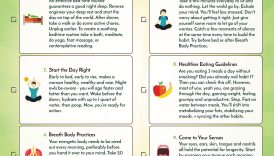Cracking the Code to a Healthier You: Tips and Tricks

The journey towards a healthier lifestyle can often feel overwhelming. Many people struggle with knowing where to start or how to maintain motivation in the long run. Yet, taking the first step is often as simple as exploring fundamental concepts related to nutrition, physical activity, and mental well-being. These elements are the pillars supporting a balanced life and can lead to not only physical health but emotional and mental resilience as well.
- Cracking the Code to a Healthier You: Tips and Tricks
- The Importance of a Holistic Approach
- Understanding the Basics of Nutrition
- Importance of a Balanced Diet
- Nutrient-Rich Foods to Include in Your Meals
- Incorporating Physical Activity into Your Routine
- Benefits of Regular Exercise
- Types of Workouts for All Fitness Levels
- The Power of Mindfulness and Stress Management
- Techniques for Reducing Stress
- Mindful Eating Practices
- Prioritizing Sleep for Overall Well-Being
- Importance of Quality Sleep
- Tips for Improving Sleep Hygiene
- Building Healthy Habits for Long-Term Success
- Setting Realistic Goals
- Strategies for Consistency and Motivation
The Importance of a Holistic Approach
Rather than viewing health as a one-dimensional goal, it’s beneficial to consider it holistically. This means integrating numerous practices into everyday life. By embracing diverse methods to improve wellness, individuals can discover what specifically resonates with their personal circumstances and preferences. For example, one person may thrive on a plant-based diet while another may find success with a balanced intake of all food groups. The energy levels, mood stability, and performance improvements observed when engaging in regular physical activities can create motivation to continue. Key elements to consider include:
- Nutrition: What you eat affects your energy, mood, and overall health.
- Physical activity: Regular exercise enhances physical fitness and emotional health.
- Mindfulness: Understanding stress management can significantly impact overall well-being.
By weaving these practices into the fabric of daily life, individuals can sustainably achieve and maintain their health goals, leading to a happier and more fulfilling existence. The next sections will delve into practical ways to embrace these components and thrive in a balanced lifestyle.
Understanding the Basics of Nutrition
A balanced diet is a cornerstone of a healthy lifestyle, yet it can often seem like a complex and daunting task. The beauty of understanding nutrition lies in its simplicity. By focusing on balance and variety, anyone can create a diet that fuels their body and mind effectively.
Importance of a Balanced Diet
A balanced diet supplies the essential nutrients needed for our bodies to function optimally. It not only supports physical health but also influences mental and emotional well-being. Personal experiences illustrate this, as someone who has implemented a balanced diet often reports improved energy levels, mood stability, and better focus throughout the day. Key benefits of a balanced diet include:
- Improved Energy Levels: Proper nutrient intake helps stave off fatigue and keeps you energized.
- Enhanced Mood: Certain foods can positively influence brain function, leading to better emotional health.
- Weight Management: A balanced approach to eating encourages mindful choices, aiding in weight control.
Nutrient-Rich Foods to Include in Your Meals
Incorporating nutrient-dense foods into your daily meals doesn’t have to be complicated. Start small and gradually expand your repertoire. Here’s a list of some vital food groups to consider:
- Fruits and Vegetables: Aim for a rainbow of colors to ensure a variety of vitamins and minerals.
- Whole Grains: Oats, quinoa, and brown rice provide fiber and energy.
- Lean Proteins: Chicken, fish, beans, and legumes support muscle repair and growth.
- Healthy Fats: Avocados, nuts, and olive oil enhance brain function and promote heart health.
By understanding the basics of nutrition and integrating these principles into daily living, individuals can cultivate habits that promote lifetime wellness. Exploring meals rich in essential nutrients not only benefits physical health but also encourages a more fulfilling and vibrant life.
Incorporating Physical Activity into Your Routine
With a solid foundation of nutrition understood, the next step is to embrace physical activity as a vital component of a healthy lifestyle. Regular exercise is not just about shedding pounds or building muscle; it significantly impacts overall well-being, making it an essential focus for anyone seeking a more balanced life.
Benefits of Regular Exercise
The advantages of incorporating physical activity into one’s daily routine are numerous and far-reaching. For instance, many individuals notice a remarkable improvement in their mood after engaging in exercise. This transformation can be attributed to the endorphins released during workouts, commonly referred to as “feel-good” hormones. Some key benefits of regular exercise include:
- Enhanced Mood: Physical activity can reduce feelings of anxiety and depression.
- Increased Energy Levels: Regular movement combats fatigue and boosts overall energy.
- Better Sleep: Engaging in exercise can promote deeper, more restful sleep.
- Improved Cognitive Function: Exercise enhances mental clarity and focus through increased blood flow to the brain.
Types of Workouts for All Fitness Levels
When it comes to exercise, there’s something for everyone, regardless of fitness level. It’s essential to choose activities that resonate with personal preferences and goals. Here are a few popular workout types:
- Cardio: Running, cycling, and swimming raise heart rates and burn calories.
- Strength Training: Weight lifting or bodyweight exercises build muscle and improve metabolism.
- Flexibility and Balance: Yoga and Pilates enhance flexibility and promote core strength.
- Low-Impact Options: Walking, swimming, or cycling are great for beginners or those with joint concerns.
Embarking on this fitness journey can feel daunting, but starting slow with enjoyable activities will cultivate a sense of achievement and motivation. As individuals begin to incorporate more physical activity into their routines, they often discover newfound energy and resilience, ultimately enriching their overall quality of life.
The Power of Mindfulness and Stress Management
Having established the importance of nutrition and physical activity, it’s vital to shift our focus to another critical aspect of health: mindfulness and stress management. In today’s fast-paced world, stress is practically inevitable, but how we manage it can significantly impact our overall well-being. By incorporating mindfulness techniques into our daily lives, we can cultivate a more balanced and peaceful state of mind.
Techniques for Reducing Stress
Many individuals have found that practicing mindfulness not only helps reduce stress but also enhances their ability to navigate challenges. Simple techniques can lead to profound changes in how one reacts to stress. Here are a few methods that have worked wonders for many people:
- Deep Breathing: Taking a few moments to focus on your breath can ground you and promote relaxation.
- Meditation: Dedicating even five minutes a day to meditation can help clear the mind and reduce anxiety.
- Progressive Muscle Relaxation: This technique involves tensing and relaxing different muscle groups to release physical tension.
- Nature Walks: Spending time outdoors and connecting with nature can rejuvenate the spirit and lower stress levels.
Mindful Eating Practices
Another powerful way to incorporate mindfulness into daily life is through mindful eating. This practice encourages individuals to savor their food and be fully present during meals. One personal anecdote illustrates this perfectly; a woman shared how shifting from mindlessly snacking to mindful eating allowed her to appreciate flavors and textures in a way she had never experienced before. Here are some mindful eating practices to try:
- Eat Slowly: Take the time to chew and savor each bite.
- Limit Distractions: Avoid screens and focus on the meal in front of you.
- Listen to Your Body: Pay attention to hunger cues and eat until satisfied, not stuffed.
By integrating mindfulness into both stress management and eating habits, individuals can develop a deeper connection to their health, ultimately transforming their relationship with food and stress. This holistic approach fosters greater well-being and resilience.
Prioritizing Sleep for Overall Well-Being
As we journey through enhancing our nutrition, physical activity, and mindfulness practices, we must not overlook one of the most vital elements of health: sleep. Getting quality rest is fundamental for both physical and mental well-being, yet many people often sacrifice sleep to meet the demands of daily life. Understanding the importance of sleep can inspire positive changes.
Importance of Quality Sleep
Quality sleep is essential for various bodily functions, including immune response, cognitive performance, and emotional regulation. Personal experiences reveal that a good night’s sleep significantly influences how individuals feel and perform the following day. A well-rested person is more alert, focused, and equipped to tackle challenges effectively. Benefits of quality sleep include:
- Enhanced Cognitive Function: Better memory retention and improved problem-solving skills.
- Emotional Stability: Reduced irritability and a more positive outlook.
- Physical Health: Stronger immunity and reduced risk of chronic health conditions.
Tips for Improving Sleep Hygiene
To prioritize sleep effectively, adopting good sleep hygiene practices can transform nightly rest. Many individuals have discovered that small changes to their routine significantly enhance the quality of their sleep. Here’s a list of practical tips to consider:
- Create a Consistent Sleep Schedule: Go to bed and wake up at the same time every day, even on weekends.
- Limit Screen Time Before Bed: The blue light from screens can interfere with melatonin production. Aim to unplug at least an hour before sleep.
- Create a Relaxing Bedtime Ritual: Engage in calming activities like reading, meditating, or taking a warm bath.
- Optimize Your Sleep Environment: Keep the bedroom cool, dark, and quiet to promote restful sleep.
By recognizing the significance of quality sleep and implementing these tips, individuals can not only improve their rest but also enhance their overall well-being. A well-rested life leads to more energy, better focus, and ultimately a greater capacity to enjoy life’s rich experiences. Prioritizing sleep is a powerful investment in health.
Building Healthy Habits for Long-Term Success
With sound nutrition, physical activity, mindfulness, and quality sleep in check, the next step is to solidify these practices into consistent, healthy habits that support long-term success. Transforming health goals into lasting lifestyle changes often begins with two crucial components: setting realistic goals and employing strategies that foster consistency and motivation.
Setting Realistic Goals
The journey to better health can be daunting, especially if one sets overly ambitious targets. When goals are too lofty, frustration often ensues, leading individuals to abandon their efforts altogether. Personal experiences illustrate that starting small can yield significant results. For example, instead of vowing to run a marathon, a more manageable goal might be to walk for 20 minutes several times a week. Consider these guidelines for setting effective goals:
- Be Specific: Instead of “eating healthier,” aim for “incorporating one vegetable in every meal.”
- Make It Measurable: Track progress, like recording weekly workouts or meal planning successes.
- Set Time Frames: Establish deadlines to provide a sense of urgency, such as aiming to drink eight glasses of water daily for a month.
Strategies for Consistency and Motivation
Maintaining consistency can be challenging, but several strategies can help keep motivation high. For instance, one might find inspiration through community support or accountability partners. Joining a group for fitness classes or sharing goals with friends can create an encouraging atmosphere. Here are additional strategies to consider:
- Celebrate Small Wins: Acknowledge and reward even minor accomplishments to boost morale.
- Keep a Journal: Documenting progress can highlight achievements and reveal patterns over time.
- Stay Flexible: If obstacles arise, adjust goals rather than abandoning them altogether.
By implementing realistic goals and employing motivational strategies, individuals can establish and maintain healthy habits that promote enduring success. This holistic approach to health makes the journey toward a fulfilling life not only attainable but also enjoyable. With patience and persistence, lasting change is well within reach.




